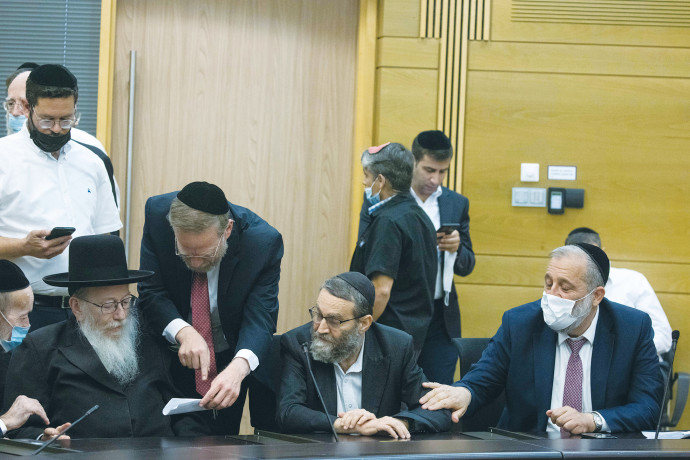Opposition leader Benjamin Netanyahu pledged this week that if he is elected prime minister, he would raise the budget of haredi institutions that do not teach “core studies,” thus incentivizing these institutions not to join a new Education and Finance ministries program that would supply funding to schools that teach math, English and Hebrew.
Netanyahu’s pledge was part of an agreement reached between the sparring haredi factions, Degel Hatorah and Agudat Yisrael, according to a draft of the deal revealed on Monday.
The two factions have run together for the past 30 years as United Torah Judaism, but were on the verge of splitting up. In this scenario, at least one of the parties would probably not have passed the electoral threshold. Both factions are political allies of Netanyahu, and thus the split could endanger the opposition leader’s ability to form a government after the election.
The rift began last month when the Education Ministry published a tender geared toward the haredi community that promised significant funding on the condition that the schools teach secular subjects. The initiative is known as the “Belz Arrangement,” since it is particularly aimed at the Belz hassidic group that is part of Agudat Yisrael, and whose schools were denied entry into the education system controlled by Degel Hatorah.
Belz’s willingness to enter the initiative infuriated Degel Hatorah and its longtime leader, MK Moshe Gafni, who viewed the program as unwarranted state intervention into haredi education.
That was the crux of the contention between the two factions.

Belz agreed to turn down the Education Ministry’s initiative, in exchange for a pledge that Netanyahu will reimburse them by upping the state funding they are currently receiving, and legislate this raise into the national budget. The parties also agreed that their list to the Knesset would continue as planned, with Agudat Yisrael receiving the first spot, Degel Hatorah receiving the second, and so forth in a “zipper” alignment.
Politicians and parties in the anti-Netanyahu bloc criticized him for incentivizing haredi schools not to teach core studies, thus hurting haredi children’s chances of entering the workforce when they grow up.
“If in order to survive politically, Bibi will need to endanger hundreds of thousands of haredi people’s futures in the workforce and hurt their livelihoods – he will do so without thinking twice,” Yesh Atid wrote on Twitter. “That is what happens when personal preferences, along with a narrow and disconnected political interest, come before the concern for the future of citizens.”
Alternate Prime Minister Naftali Bennett, who served in the past as Education minister, tweeted: “Passing enormous sums of money to schools that refuse to teach English and mathematics will create an entire generation of young people without the skills necessary to work and support themselves. This is a move that threatens the future of the State of Israel. It simply is not fair. Not for the haredi youngsters, who are doomed to ignorance, and who will set out into the world unprepared, lacking the ability to support themselves and their families.”
What is the basis of their disagreement?
Education Minister Yifat Shasha-Biton said on Army Radio on Tuesday that “the significance [of the deal] on the most basic level is that it thrusts poverty on Israel’s haredi children. I want the public to understand what we are talking about here. In the past year, we developed an arrangement stipulating that schools teaching core studies will be funded accordingly. The idea is to truly insert all of the core studies into the schools that will be taught optimally, with oversight and testing.
“We have a true duty to give every child in the State of Israel, including haredi children, the tools and skills that they will need for their adult lives.”
Haredi politicians countered on Tuesday that the state should not interfere in how the sector chooses to educate its children, and that all they were asking was for the state to grant them funding based on what state education institutions receive.
According to Israeli law, schools that are considered “recognized but not official” receive 75% of the funding awarded to state schools, while schools that are completely private receive 55% of that funding. Those private schools are not required to teach core studies.
In reality, the percentages are equated to only part of what state schools receive, so the gap in funding between state schools and other schools is actually larger.
Haredi politicians argued that all the agreement calls for was for the state to respect the law and grant the private schools what they are due: 55% out of the entire sum that state schools are awarded.
Netanyahu’s repairing of the UTJ rift is another achievement after he brokered an agreement between Religious Zionist Party leader MK Bezalel Smotrich and Otzma Yehudit leader MK Itamar Ben-Gvir on August 26.
The deal may encounter legal difficulties and will require legislation to properly anchor it, including a superseding clause that will prevent the High Court from disqualifying it.
